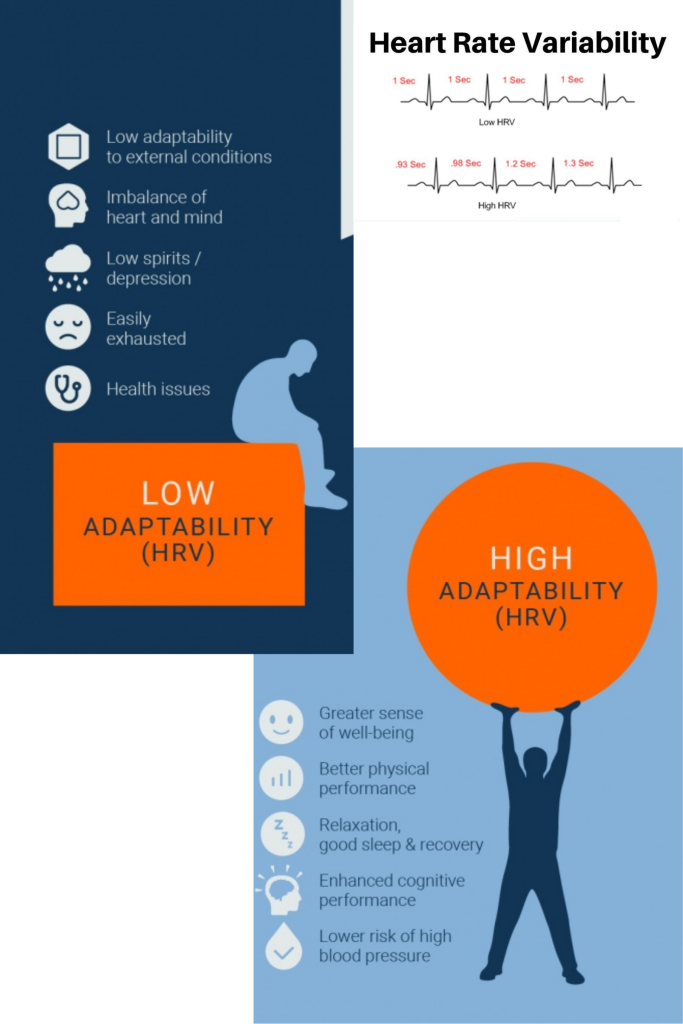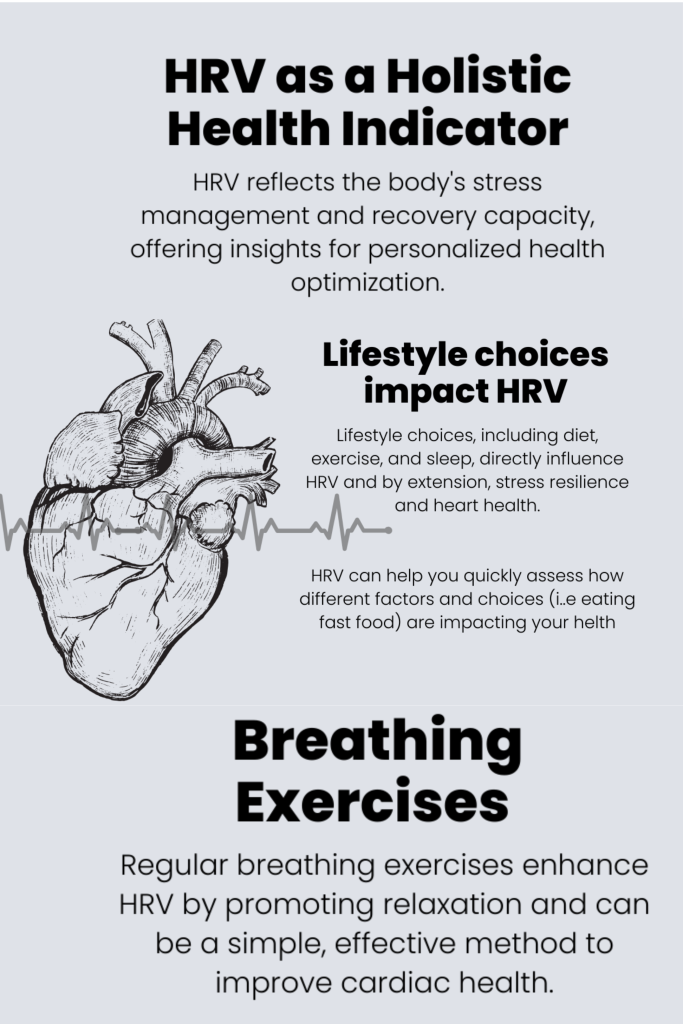What is HRV Testing?
Our HRV Test is a non-invasive assessment that measures the variation in time between successive heartbeats (R-R intervals). It provides detailed insights into the balance between the two branches of the autonomic nervous system (ANS):
Sympathetic Nervous System (SNS):
- Known as the “fight or flight” system.
- Responsible for stress responses, increasing heart rate, blood pressure, and energy availability during challenging situations.
Parasympathetic Nervous System (PNS):
- Known as the “rest and digest” system.
- Promotes relaxation, recovery, and energy conservation by slowing the heart rate and reducing stress responses.
Why do our HRV Test?
Heart Rate Variability (HRV) is a powerful indicator of health, resilience, and performance because it reflects the balance and adaptability of your autonomic nervous system (ANS). By tracking and improving HRV, you can better adapt to stress, recover efficiently, and optimise your overall health and resilience.
Our HRV test is designed to:
- Assess the body’s ability to adapt to stress and recover effectively.
- Provide a baseline measurement of autonomic nervous system function.
- Help individuals recognise stress patterns and develop biofeedback techniques to improve HRV.
- Optimise performance and recovery for athletes.
Who Should Get HRV Testing?
HRV testing is ideal for:
- Athletes: Track recovery, optimise performance, and adapt training intensity.
- Executives and Professionals: Understand stress patterns and improve decision-making.
- Health-Conscious Individuals: Monitor overall well-being and resilience over time.
- Stress Management Seekers: Assess the physiological impact of chronic stress and guide effective interventions.

Test Protocol
Pre-Test Preparation
- Avoid caffeine, stimulants, and alcohol for 3-4 hours before the test.
- Avoid strenuous physical activity for 24 hours prior to testing.
- Rest for 10-15 minutes before starting the test.
- Empty the bladder to ensure comfort.
Test Preparation
- We place a BVP sensor on your finger tip for blood volume pulse measurement
Testing Phase
- Baseline Recording (5 Minutes): sit in a comfortable upright position with your arms relaxed resting on your lap
- Guided Breathing Phase (5 Minutes): follow a paced breathing routine (e.g., 6 breaths per minute) to measure HRV coherence and parasympathetic activation.
- Recovery Phase (2-3 Minutes): return to normal breathing and record HRV to assess recovery
Data and Insights
Participants receive a detailed report, including:
- Overall HRV
- Parasympathetic activity
- Balance between sympathetic and parasympathetic systems
- Visualisation of you HRV patterns
As part of your appointment, we will walk you through your results, providing personalised recommendations and actionable steps to help you achieve meaningful improvements.

FAQ
How long does the HRV test take?
- The total appointment will be about 40 minutes. The test typically lasts 15-20 minutes, including baseline measurement, paced breathing exercises, and recovery phases.
How should I prepare for the test?
- Avoid caffeine, alcohol, or stimulants for at least 4 hours before the test.
- Avoid exercise for 24 hours prior.
- Sit or lie down quietly for 10-15 minutes before the test to achieve a relaxed state.
- Wear loose, comfortable clothing.HbA1c and CRP: No fasting is required.
How often should I take a Metabolic Health Blood Test?
- Athletes: Regular testing during training phases to monitor recovery.
- Stress Management: Weekly or monthly testing to track improvements.
- Health Monitoring: As part of routine check-ups or when managing chronic conditions.
What are some implications of a low HRV?
Physical Health Implications
- Cardiovascular Risk: Low HRV is associated with a higher risk of hypertension, heart disease, and arrhythmias due to poor autonomic regulation.
- Metabolic Dysfunction: Linked to insulin resistance, type 2 diabetes, and obesity.
- Chronic Inflammation: Low HRV often correlates with elevated C-reactive protein (CRP), a marker of systemic inflammation.
Poor Recovery and Fatigue
- Overtraining in Athletes: Persistent low HRV can indicate insufficient recovery from intense training, leading to reduced performance and risk of injury.
- Physical Exhaustion: The body remains in a stressed state, unable to shift into recovery mode effectively.
Stress and Mental Health
- Chronic Stress: Low HRV reflects prolonged activation of the sympathetic nervous system, making it harder for the body to relax and recover.
- Anxiety and Depression: Individuals with mood disorders often show consistently low HRV, indicating poor emotional regulation and heightened stress sensitivity.
- Cognitive Fatigue: Low HRV is associated with reduced focus, decision-making ability, and mental clarity.
Longevity and Aging
- Accelerated Aging: HRV naturally declines with age, but consistently low HRV can signify premature aging of the cardiovascular and nervous systems.
- Shortened Lifespan: Low HRV is a predictor of higher all-cause mortality, particularly from cardiovascular and metabolic diseases.
How is this test different from my wearable device?
We offer clinical-grade accuracy and detailed HRV analysis (e.g., time-domain and frequency-domain metrics). Wearable devices provide general trends but lack the precision and depth of biofeedback-focused systems. Our test is conducted in a controlled environment with a structured test protocol which allows for more effective analysis and tracking over time.
